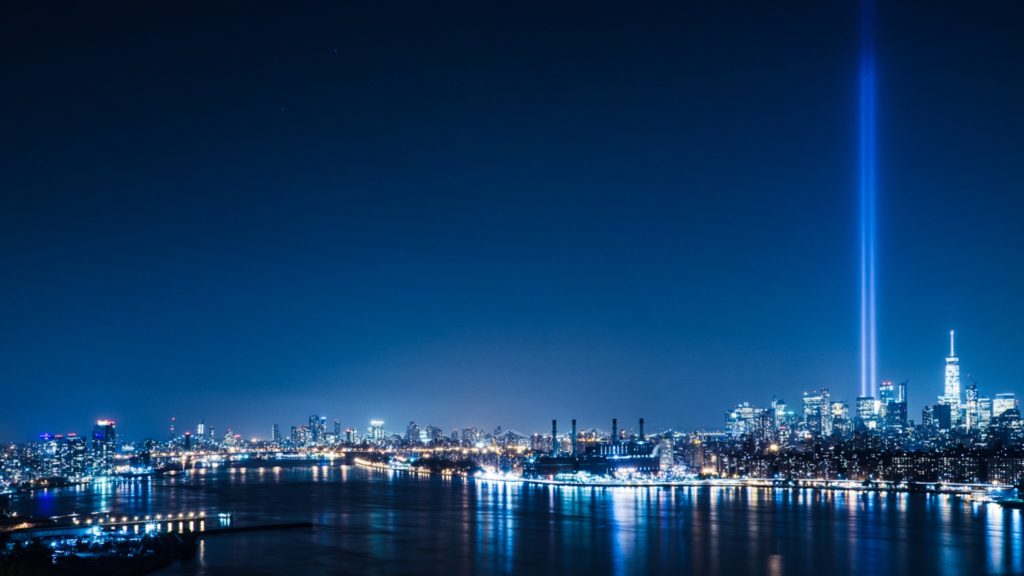I’ve been teaching college students for the past decade or so, and every year I pose the same question to my freshmen: Where were you on September 11, 2001? My first year of teaching a freshman writing seminar, the question led to a disarming conversation about how their 8th grade teachers handled the news. Students from Manhattan and Brooklyn had parents who’d worked at Cantor Fitzgerald. They recounted with visceral detail how it felt not to know until late that day if their parents were OK. The eternity of waiting.
Five years later, the discussion was different. Now freshmen described a glimpse of memory of a first-grade teacher attempting to figure out how to talk as events unfolded. If pushed they had to admit they didn’t know if they remembered watching news footage of the attacks that day, or if their memory was of seeing that footage over and over years later. One student was certain her first grade teacher made a point of not showing them the smoke pouring out of the World Trade Center towers. “I was sure I saw it that day,” another student said, “but now that we’re talking about it I honestly don’t know.” When I recounted my own story of watching the events unfold from Brooklyn and then Manhattan that day, as I found myself doing each fall, they listened more intently than past students had. I was recounting a history they didn’t wholly remember.
Last year when I asked the question, I found myself a bit in shock at the response. I hadn’t prepared myself for the answer. Last year’s freshmen were not yet a year old on September 11, 2001. They knew of it only as a number, or from reading about it. To them, it was history.
This fall, the students sitting in freshmen classrooms across the country will be more distant still. This fall’s freshmen will be the first college students whose answer to the question, “Where were you on 9/11?” will be: I wasn’t born yet.
This year’s freshmen will also be our second class of post-millennials, the next generation that is now being commonly referred to as Gen Z. Last year’s were the first. I’ll confess I couldn’t tell what they thought when I recounted my own experiences in New York on 9/11. Frankly, we were still kind of reeling from the 2016 election, and so it seemed somehow secondary. Probably I seemed old. Probably the story I was telling was more tinged with nostalgia than I can account for, telling it almost two decades later. I do know that they listened intently as I described riding the subway from Ft. Greene to Midtown, watching the smoke billowing out of Tower Two from a stopped D train on the Manhattan Bridge. I’m sure I embellished the story. But at this point I don’t even know how. Probably it was as much a retelling of the version I’d told the year before, and the year before that, than it was the story of the thing itself.
The first-year writing class I teach is called “Stranger Than Fiction.” The syllabus focuses on texts that walk the wily line between fiction and nonfiction, books and essays by writers like Orwell, Isaac Babel, Lorrie Moore, WG Sebald. Around the second week of classes, when 9/11 rolls around, I often assign a set of readings related to the events. We read Tom Junod’s iconic Esquire piece “The Falling Man,” about a photograph that ran on the Times’ front page of a man in free-fall against the backdrop of one of the Towers, a piece I helped usher to publication as an editor there. We’ll look at parts of Ken Kalfus’s A Disorder Peculiar to the Country, reporting on the events from The New Yorker. For this year’s freshmen those readings will smack of history. They’ll have been published in legacy print magazines and books, not online. The PDFs I post for them to download are looking a little grainy.
I’ve spent a lot of time this summer thinking about these new freshman, who were born into a post-9/11 world. The term used most frequently is “Gen Z,” but I’m skeptical it’ll last. Some how it feels too reactionary. Post-Millennials sounds reactionary, too. The 9/12 Generation wouldn’t be all bad. Or maybe we could spare them from having to have a generational moniker at all. I myself was born in 1978 and I don’t belong to a generation as currently defined: I came of age after the Gen-Xers, and I’m too old to be a Millennial. My clearest topical memory was of my second grade teacher rolling a TV in on a cart so we could watch the Challenger launch, only to watch it explode. No college professor ever asked me where I was when Christy McAuliffe died. Maybe this is what it means to move decades, not months or years away from epochal events. Three months after 9/11, I wasn’t asking college students about literary treatments of the event. At that point I was just a twentysomething magazine editor, and I kept asking, “Why are these fighter jets still flying over Brooklyn?” Or a year later: “When will I start sleeping through the night again?” Those questions eventually had answers.
Last year will be the last time I’ll have asked, “Where were you when the Towers fell?” It’s time to find a new question to ask each fall. Maybe it’ll be something like, Where were you when you heard the election results on November 7, 2016? And maybe one day, “Where were you the day our Democracy was saved?” A suddenly-kind-of-old professor can dream.
Daniel Torday is the winner of the 2017 Sami Rohr Choice Award. His new novel, Boomer1, is out this fall from St Martin’s Press.
from The Paris Review https://ift.tt/2x8rdHA

Comments
Post a Comment